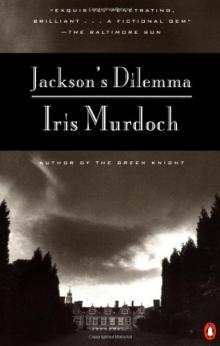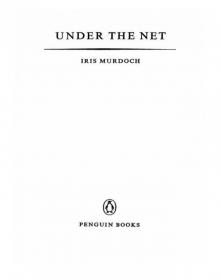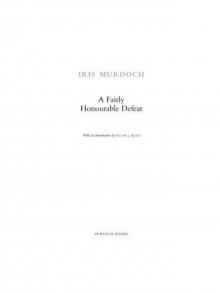- Home
- Iris Murdoch
A Fairly Honourable Defeat
A Fairly Honourable Defeat Read online
Table of Contents
Title Page
Copyright Page
Introduction
Dedication
PART ONE
CHAPTER ONE
CHAPTER TWO
CHAPTER THREE
CHAPTER FOUR
CHAPTER FIVE
CHAPTER SIX
CHAPTER SEVEN
CHAPTER EIGHT
CHAPTER NINE
CHAPTER TEN
CHAPTER ELEVEN
CHAPTER TWELVE
CHAPTER THIRTEEN
CHAPTER FOURTEEN
CHAPTER FIFTEEN
CHAPTER SIXTEEN
CHAPTER SEVENTEEN
CHAPTER EIGHTEEN
CHAPTER NINETEEN
CHAPTER TWENTY
PART TWO
CHAPTER ONE
CHAPTER TWO
CHAPTER THREE
CHAPTER FOUR
CHAPTER FIVE
CHAPTER SIX
CHAPTER SEVEN
CHAPTER EIGHT
CHAPTER NINE
CHAPTER TEN
CHAPTER ELEVEN
CHAPTER TWELVE
CHAPTER THIRTEEN
CHAPTER FOURTEEN
CHAPTER FIFTEEN
CHAPTER SIXTEEN
CHAPTER SEVENTEEN
CHAPTER EIGHTEEN
CHAPTER NINETEEN
CHAPTER TWENTY
CHAPTER TWENTY-ONE
CHAPTER TWENTY-TWO
CHAPTER TWENTY-THREE
CHAPTER TWENTY-FOUR
PENGUIN CLASSICS
A FAIRLY HONOURABLE DEFEAT
IRIS MURDOCH was born in Dublin in 1919, grew up in London, and received her university education at Oxford and later at Cambridge. In 1948 she became a Fellow of St. Anne’s College, Oxford, where for many years she taught philosophy. In 1987 she was appointed Dame Commander, Order of the British Empire. She died on February 8, 1999. Murdoch wrote twenty-six novels, including Under the Net, her writing debut of 1954, and the Booker Prize-winning The Sea, the Sea (1978). She received a number of other literary awards, among them the James Tait Black Memorial Prize for The Black Prince (1973) and the Whitbread Prize for The Sacred and Profane Love Machine (1974). Her works of philosophy include Sartre, Romantic Rationalist (1980), Metaphysics as a Guide to Morals (1993), and Existentialists and Mystics (1998). She also wrote several plays and a volume of poetry.
PETER REED was born in London, and is Professor of English at the University of Minnesota, where he teaches modern British and American literature. His recent publications include a focus on the work of Kurt Vonnegut.
By the same author
Philosophy
SARTRE, ROMANTIC RATIONALIST
THE FIRE AND THE SUN
ACOSTOS: TWO PLATONIC DIALOGUES
METAPHYSICS AS A GUIDE TO MORALS
EXISTENTIALISTS AND MYSTICS
Fiction
UNDER THE NET
THE FLIGHT FROM THE ENCHANTER
THE SANDCASTLE
THE BELL
SEVERED HEAD
AN UNOFFICIAL ROSE
THE UNICORN
THE ITALIAN GIRL
THE RED AND THE GREEN
THE TIME OF THE ANGELS
THE NICE AND THE GOOD
BRUNO’S DREAM
A FAIRLY HONOURABLE DEFEAT
AN ACCIDENTAL MAN
THE BLACK PRINCE
THE SACRED AND PROFANE LOVE MACHINE
A WORD CHILD
HENRY AND CATO
THE SEA, THE SEA
NUNS AND SOLDIERS
THE PHILOSOPHER’S PUPIL
THE GOOD APPRENTICE
THE BOOK AND THE BROTHERHOOD
THE MESSAGE TO THE PLANET
THE GREEN KNIGHT
JACKSON’S DILEMMA
Plays
A SEVERED HEAD (with J. B. Priestley)
THE ITALIAN GIRL (with James Saunders)
THE THREE ARROWS and
THE SERVANTS AND THE SNOW
THE BLACK PRINCE
Poetry
A YEAR OF BIRDS
(Illustrated by Reynolds Stone)
PENGUIN BOOKS
Published by the Penguin Group
Penguin Putnam Inc., 375 Hudson Street,
New York, New York 10014, U.S.A.
Penguin Books Ltd, 27 Wrights Lane, London W8 5TZ, England
Penguin Books Australia Ltd, Ringwood, Victoria, Australia
Penguin Books Canada Ltd, 10 Alcorn Avenue,
Toronto, Ontario, Canada M4V 3B2
Penguin Books (N.Z.) Ltd, 182-190 Wairau Road,
Auckland 10, New Zealand
Penguin Books Ltd, Registered Offices: Harmondsworth, Middlesex, England
First published in Great Britain by Chatto & Windus 1970
First published in the United States of America by The Viking Press 1970
Published in Penguin Books (U.K.) 1972
Published in Penguin Books (U.S.A.) 1979
This edition with an introduction by Peter J. Reed
published in Penguin Books (U.S.A.) 2001
Copyright © Iris Murdoch, 1970 Copyright renewed Iris Murdoch, 1998 Introduction copyright © Peter J. Reed, 2001 All rights reserved
LIBRARY OF CONGRESSCATALOGING-IN-PUBLICATION DATA
Murdoch, Iris.
A fairly honourable defeat / Iris Murdoch ; introduction by Peter J. Reed.
p. cm.—(Penguin twentieth-century classics)
eISBN : 978-1-101-49567-4
I. Title. II. Series.
PR6063.U7 F3 2001
823’.914—dc21 00-061138
http://us.penguingroup.com
INTRODUCTION
“All our failures are ultimately failures in love,” says the Abbess in Iris Murdoch’s earlier novel The Bell (1958). The “fairly honourable defeat” that gives this novel its title represents another such failure. Or failures, since there is more than one. Love—its failures, its excesses, its blindnesses, and yes, its modest triumphs—is a constant theme in the work of Iris Murdoch. In a conversation, the novelist Pamela Hansford Johnson once referred to Murdoch’s novels as “dear Iris’s amatory gavottes.” The image of a dance in which one moves from partner to partner suits these novels well, for in many, as in A Fairly Honourable Defeat, the interchanging relationships at times suggest parody or soap opera. Relationship is what interests Murdoch, and thus her endless explorations often involve large casts of characters, suspenseful intrigues and complications, and shifting narrative focus. These distinctive characteristics make Murdoch a novelist whose characters stick in the memory less than do her situations and ideas. And that is appropriate for a novelist who began as a philosopher.
Iris Murdoch was born in Dublin in 1919 of Protestant Irish parents, although the family moved to England when she was only a year old. She has recounted that she began writing adventure stories when she was only nine years old. Murdoch went on to study “Greats” (the challenging program combining Greek, Latin, ancient history, and philosophy) at Somerville College, Oxford, graduating in 1942 with a First-class degree. Under the wartime conscription she was inducted into the civil service, working first for the Treasury and later for the U.N. Relief and Rehabilitation Administration (UNRRA). Her experience in the latter of dealing with war refugees made a lasting impression, evidence of which emerges in A Fairly Honourable Defeat. After the war she returned to the study of philosophy, with a particular interest in the French Existentialists (her first book would be on Jean Paul Sartre: Sartre, Romantic Rationalist [1953]). By 1948 Murdoch was a fellow and philosophy tutor at St. Anne’s College, Oxford, and continued in this position until 1963, by which time her growing reputation as a novelist enabled her to devote full tim
e to writing.
In 1952 Murdoch met John Bayley, an English literature don at New College, Oxford, and married him in 1956. Their marriage was to continue until February 8, 1999, when Iris finally succumbed to Alzheimer’s disease. Those final years together, when her diminished capacities reduced her to an almost childlike dependence from which emerged a new form for their loving relationship, are touchingly recorded in Bayley’s Elegy for Iris (1999) and Iris and Her Friends (2000).
Murdoch’s first novel, Under the Net (1954), appeared at a time when the so-called Angry Young Men were commencing their short reign over the British novel, and in some respects its protagonist resembles the picaros of such comedies as Kingsley Amis’s Lucky Jim or John Wain’s Hurry on Down. But her distinctive brand of comedy, more funny-bizarre than funny-ha-ha, already emerges, and the strong philosophical bent is apparent. From this beginning, Murdoch went on to become extraordinarily prolific, her novels appearing increasingly frequently and also, generally, filling more pages. A Fairly Honourable Defeat (1970) falls short of the midpoint of a career in which she produced twenty-six novels in addition to nonfiction, plays, and poetry.
Love and the search for self-identity are twin themes in many of Murdoch’s novels, including A Fairly Honourable Defeat. “Love is the imaginative recognition of, that is respect for, the otherness of another person,” she writes in “The Sublime and the Good.” That means striving to observe and respect the separateness of others rather than projecting identities and roles upon them. Granting others their particular individuality rather than expecting them to conform to stereotypes, characterizations, or expectations that are extensions of an individual’s own formulated vision of the world also means extending them freedom. There is no room for possessiveness in this kind of love, or for self-centeredness. In Murdoch the affirmation of love often comes not in the traditional romantic “boy gets girl” but in “boy lets girl go.”
The reverse of such other-respecting love is solipsism, the kind of self-centeredness that, in its extreme form, sees an individual projecting his or her own particular view onto the surrounding world and those who populate it. Life then becomes a kind of drama to the solipsist, who in effect makes other people into characters and roles to which he or she may be the central character or even author. Murdoch describes solipsism as approaching a neurotic state when “we are completely enclosed in a fantasy world of our own into which we try to draw things from outside, not grasping their reality and independence, making them into dream objects of our own” (“The Sublime and the Good”).1 In lesser degrees, it is a common phenomenon. Experience leads people to codify what they learn into a pattern of perceptions and responses, a system of judgments, by which they interpret and respond to what life presents. One of Murdoch’s favorite situations is to bring a character to a point where his or her solipsistic set of perceptions no longer answers to reality. This failure produces some form of psychological disintegration, until a series of revelations or recognitions brings the character to a new state of self-knowledge. Variants of this pattern of experience are recurrent in Murdoch’s fiction.
The critic James Hall has contrasted Murdoch’s method with that of the traditional British novel of the eighteenth and nineteenth centuries. There the typical plot involves taking the protagonist through a series of situations that involve making social and moral choices. Through these choices and their consequences, the hero goes through a moral and social education. In Murdoch’s novels, however, sets of characters become involved in representative situations that repeat themselves. Thus, alternative responses to repeated situations are tried out. This, Hall argues, tends to bring the novelist near to being the central character, inasmuch as she is the one who faces the alternatives, makes the choices, and is the vehicle of education (The Lunatic Giant in the Drawing Room, 1968).2 The advantage is that Murdoch can experiment with a wider range of alternatives than in the traditional novel by using more characters and repeated situations. The disadvantage is that the plot may appear contrived and complicated, and the multiple characterizations, thinner.
An interesting feature of Murdoch’s work is that while the number of characters may at first be distracting and the plot complicated, the geography is invariably precise. Locations are mapped with care, floor plans supplied graphically, and movements traced with an almost military precision. In her London scenes her characters’ movements can be followed street by street. The literalness of the geography supplies a certainty and tangibility that underpins the novel even when the plot becomes more bizarre, events fantastic, and characters drift from reality.
Yet Murdoch’s is not a strictly literal world. While her narrative technique may seem to be, in the main, that of the traditional realist, in fact it makes frequent departures from that mode. Despite her emphasis on social interactions, her method is not consistently mimetic. For instance, it is metafictional in the way that she incorporates into the narrative the recognition of the author’s role in manipulating the characters and circumstances of his or her fictional world. In A Fairly Honourable Defeat there is no shortage of people—Julius being the most conspicuous—anxious to manipulate or manage the lives of others and to create situations through their interpretation of or intervention in events. Julius may be alone in calling people “puppets,” but he is not alone in treating them as such or in imagining plots for them. There are other metafictional hints, such as the obvious echoes of Shakespeare’s malignant Iago in the actions of Julius, who is just as invariably called “honest.” The level of contrivance—in this novel the broken telephone, the car that will not start, the purloined letters—may exceed normal expectations of plausibility. Even elements of the fantastic are not unusual in Murdoch’s novels.
Murdoch’s geography may also have symbolic function. In A Fairly Honourable Defeat, for instance, the ethnically mixed and turbulent Notting Hill that Tallis inhabits contrasts with the middle-class serenity of Hilda and Rupert Foster’s home in S.W. 10. The drowning of the hedgehog may be a traditional foreshadowing of a later event, but if one notes the English country folklore that hedgehogs kill snakes, then its death presages the exposure of the Fosters’ Edenic garden to the serpentine Julius. Scenes such as Julius in the pool, with the roiling black water and the supernaturally red mouth, or Morgan’s nightmarish descent into the Underground in pursuit of a pigeon border on surrealism.
Those two fantastic scenes, of course, also have their comic side, and it is well to remember that Murdoch is a comic novelist. The comedy is often, as noted earlier, a comedy of the bizarre, a comedy of the “absurd” more in the existential sense than the farcical. In A Fairly Honourable Defeat, for instance, there are Julius’s sinister manifestations, noticed first in a darkening of the room. Or there is the dilemma of being trapped naked in someone else’s locked flat—and then doing the same thing to another person! Leonard’s bitter commentaries are comic in their misanthropic hyperbole. And there are Hilda and Rupert planning to help Morgan “pick up the pieces”; instead, Rupert picks up Morgan, and Hilda goes to pieces. Murdoch sees people as having the propensity to get into situations that become jokes on themselves, though they often arrive there with good intentions. Consequently her comedy of human folly, however penetrating, remains compassionate.
Part of the reason why people get themselves into such fixes, Murdoch suggests, is the allure of “pistol shots and anger.” People like drama, can be thrilled by violence, and find the distractions of confrontation easier than the quiet effort of communication. Aggression often triumphs over Eros in Murdoch. The explosion excites more than the step back from the brink. The stimulation of entering the new and perilous overwhelms good sense’s warnings of the consequences. Such responses abound in A Fairly Honourable Defeat. As Julius observes, “Put three emotional fairly clever people in a fix and instead of trying quietly to communicate with each other they’ll dream up some piece of communal violence.” Julius is proved right not only in estimating the allure of “communal violence,�
�� especially to Morgan and Peter, but also in recognizing the reluctance to simply communicate. Characters hold back out of fear that the other will misunderstand—or will understand all too well. They resort to indirection, they spare imagined feelings of the other party, and they write when they should speak. Rupert tells his wife to wait and read his book about love, and writes a letter to his son instead of simply speaking to him. At the conclusion, Tallis’s action in leading Julius “straight to the telephone” demonstrates effectively how forthright communication might have alleviated many of the “honourable defeats” brought about by the greater appeal of dramatics.
If the novel’s various defeats are indeed “honourable,” or “fairly” so, it is because at least some of them are motivated by good intentions. Rupert and Hilda, jointly and separately, want to help Morgan, Simon wants to spare Axel’s feelings, Morgan at least tells herself she is helping first Peter, then Rupert, and so on. Julius perhaps convinces himself that he is doing a kindness by making people confront reality. Murdoch’s “nice” people are often vulnerable because their seemingly altruistic behavior may be at heart egocentric. It is easy to succumb to what a character in her novel The Bell calls “the second best act.” This occurs when someone becomes more fascinated by his or her own responses to a given situation than to the particularity of the situation itself. As Kaehele and German wrote in discussing The Bell, “By making moral decisions complicated, the individual is likely to become so engrossed in his own personality that instead of performing the better act, he chooses the more interesting one.”3 A new situation, the possibility of playing a new role, offers the chance to experience new feelings, a new sense of oneself. If the situation provides the opportunity to participate vicariously in the life of another, its allure may be the stronger. Sometimes there is the pious satisfaction of believing one is acting out of the other’s need, as seen with Rupert, Hilda, and Morgan in A Fairly Honourable Defeat. Frequently, Murdoch suggests that the ulterior motivation in such actions is the appeal of managing or controlling others.

 Jackson's Dilemma
Jackson's Dilemma The Flight From the Enchanter
The Flight From the Enchanter The Red and the Green (Vintage Classics)
The Red and the Green (Vintage Classics) A Severed Head
A Severed Head The Black Prince
The Black Prince The Nice and the Good
The Nice and the Good The Unicorn
The Unicorn Under the Net
Under the Net The Italian Girl
The Italian Girl A Fairly Honourable Defeat
A Fairly Honourable Defeat An Accidental Man
An Accidental Man A Word Child
A Word Child The Philosopher's Pupil
The Philosopher's Pupil The Book and the Brotherhood
The Book and the Brotherhood The Good Apprentice
The Good Apprentice The Sacred and Profane Love Machine
The Sacred and Profane Love Machine The Bell
The Bell Henry and Cato
Henry and Cato Metaphysics as a Guide to Morals
Metaphysics as a Guide to Morals The Time of the Angels
The Time of the Angels Nuns and Soldiers
Nuns and Soldiers The Green Knight
The Green Knight The Sea, the Sea
The Sea, the Sea Sartre: Romantic Rationalist
Sartre: Romantic Rationalist Bruno's Dream
Bruno's Dream An Unofficial rose
An Unofficial rose Sartre
Sartre The Red and The Green
The Red and The Green